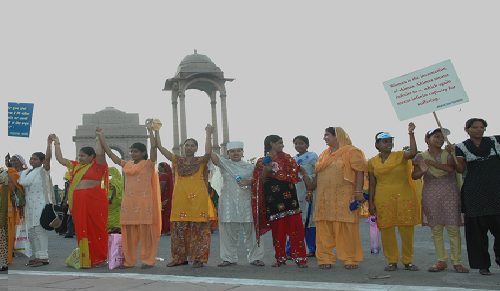N.B. Nair
London/New Delhi (ISJ): A new international research published in The Lancet estimates that over one in four women have experienced domestic violence in their lifetime. Using data from the World Health Organisation (WHO) Global Database on the Prevalence of Violence Against Women, which covers 90 percent of women worldwide, these new estimates indicate that prior to the COVID-19 pandemic 27 percent of ever-partnered women aged 15-49 had experienced physical and/or sexual violence from an intimate partner in their lifetime.
Intimate partner violence of ever-partnered women (defined as women who are or have been married, co-habit, or have a long-term sexual partner) refers to physically, sexually, and psychologically harmful behaviours in the context of marriage, cohabitation, or any other form of union. It can have major short and long-term impacts on the physical and mental health of the victim, leading to substantial social and economic costs for governments, communities, and individuals.
This new study uses population-based surveys, improved quality of data, and updated methods to provide current prevalence estimates of intimate partner violence across the world till 2018. The study only estimated physical and sexual violence and work is underway by WHO to strengthen measures of reporting psychological harmful behaviours by partners.
“Intimate partner violence affects the lives of millions of women, children, families and societies worldwide. Although this study took place before the COVID-19 pandemic, the numbers are alarming and research has shown the pandemic exacerbated issues leading to intimate partner violence such as isolation, depression and anxiety, and alcohol use, as well as reducing access to support services,” said Claudia García-Moreno of World Health Organisation
The data used in this research were from the WHO Global Database on Prevalence of Violence Against Women and include over 300 surveys and studies conducted between 2000-2018. It covers 161 countries and areas, accounting for 2 million women aged 15 years and older, representing 90 percent of the global population of women and girls. Statistical analysis allowed estimation of the prevalence of intimate partner violence over different age groups, regions, and time ranges to be calculated.
“These findings confirm that violence against women by male intimate partners remains a global public health challenge,” said Claudia García-Moreno.
Intimate partner violence is by far the most prevalent form of violence against women globally (affecting around 641 million) according to WHO. However, 6 percent of women globally report being sexually assaulted by someone other than their husband or partner. Given the high levels of stigma and under-reporting of sexual abuse, the true figure is likely to be significantly higher.
The authors however, acknowledged some limitations with the study. These include the reliance on the availability and quality of existing violence against women survey data; some important gaps remain in the data for some geographical regions and sub-populations.
A survey in India from 2006 to 2019 showed increase in the incidence of spousal violence. According to the National Family Health Survey-5 (NFHS-5) conducted in 2019-21, one in every 25 women were subjected to sexual violence by husband. The incidence was more prevalent in Karnataka (9.7 percent), Bihar (7.1 percent), West Bengal (6.8 percent) and Asom (6.1 percent).
The High Court of Delhi is also seized of the issue of marital rape. The court is hearing a batch of petitions seeking to remove an exception in the rape law, which defines rape, states that forcible sexual intercourse by a man with his wife is not rape, unless the wife is below 15 years of age.
On the other hand, the High Court of Kerala had upheld in 2021 that marital rape, is a valid ground to claim divorce, although it is not penalised in the country.
Sources: Lancet/WHO/NFHS-5
Image courtesy: Wikimedia Commons (Representational)


